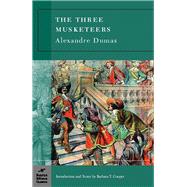From Barbara T. Cooper’s Introduction to The Three Musketeers
If Dumas’s serialized novel quickly attracted a faithful and fervent audience, it was not only because the author proved to be a master storyteller whose writing was vividly alive with emotions and actions, dialogues and duels, but also because it skillfully combined literary genres then popular with readers. By the time Dumas composed The Three Musketeers, Honoré de Balzac and others had already made the novel of initiation, or Bildungsroman, a familiar and successful form of French realist fiction. The Three Musketeers shares many of the characteristics of that genre. Like most such works, Dumas’s story focuses on an inexperienced youth who travels from the provinces to Paris in search of a broader knowledge of the world and in the hope of earning fame or fortune or both.
In chapter 1 of Dumas’s book, young D’Artagnan leaves his parents’ home in southwestern France and sets off on the road to Paris, where he hopes to join the corps of the King’s Musketeers. Before D’Artagnan leaves, his father gives him three “gifts”—fifteen crowns; a letter of introduction to Monsieur de Tréville, a fellow Gascon and former comrade-in-arms of D’Artagnan père and now the captain of the Musketeers; and a horse whose peculiar yellow color and old age significantly detract from the young man’s image as a noble and dashing hero. He also gives the lad his sword. Together with these items, the senior D’Artagnan offers his son three bits of advice: Never sell this horse; do not brook insults or fear duels for, although by law the latter are illegal, “it is by his . . . courage alone, that a gentleman can make his way nowadays”; and always serve the King and the Cardinal.
Soon after leaving home, D’Artagnan’s paternally encouraged susceptibility leads him to quarrel with a gentleman whom he will subsequently refer to as “the man from Meung” (the name of the town where they meet and where he also glimpses a beautiful woman addressed as Milady). The encounter does not end well for young D’Artagnan. Not only will he be wounded in the confrontation with the man from Meung; he will also have his letter of introduction taken from him and his sword split in two. Later, when he arrives in Paris, D’Artagnan will already be short of funds and will sell his risible and exhausted horse for cash. That sale provides him with the means to procure inexpensive lodgings and to have a new blade made for his sword. This inauspicious beginning is followed by a series of squabbles with three men (the Musketeers Athos, Porthos, and Aramis) he meets shortly after his arrival in the French capital. He agrees to a duel with each and, with the same brash courage that he has already displayed in Meung, schedules those contests back to back.
D’Artagnan’s impetuous bravado in these early encounters, along with his ignorance of the codes of behavior and the political rivalries at work in Paris and at the royal court, make it clear that the young man will need more than daring and a certain native intelligence if he is to achieve his goals. He will have to find mentors who can help him understand the complicated relationships, hidden truths, and moral subtleties of modern (that is, seventeenth-century) French life. He finds that help in the form of two surrogate father figures: Monsieur de Tréville, the captain of the King’s Musketeers, and Athos, the oldest of the three Musketeers with whom he has recently quarreled. D’Artagnan also meets Constance Bonacieux, the young and beautiful wife of his Parisian landlord and laundress to Queen Anne.
Constance will not only offer the young man an opportunity to prove his mettle, but will also win his heart. She tells D’Artagnan that the King has ordered the Queen to wear the diamond studs he gave her to an upcoming ball. Unfortunately, Anne no longer has those studs in her possession. She has given them, with her affections, to England’s handsome Duke of Buckingham. Cardinal Richelieu, who is in love with the Queen and has been spurned by her, knows this and hopes to take advantage of the difficulty the situation presents. He sends a ruthlessly seductive agent in his employ—Milady—to England to obtain the diamonds from Buckingham. If she succeeds and is able to bring the studs back before the ball, the Cardinal will be able to prove that the Queen has been unfaithful to Louis and to France. To save the Queen’s reputation and perhaps even her life, D’Artagnan must also seek out Buckingham and return the studs to Anne instead. He must overcome the obstacles of time and distance and evade the Cardinal’s agents who have been sent out to prevent him from crossing the English Channel. However determined he may be, young D’Artagnan cannot hope to prevail alone against his cunning and dogged adversaries. He therefore enlists the help of Athos, Porthos, and Aramis, who will accompany him on this crucial and dangerous voyage. The journey, the final stages of which the young man completes alone (his friends having been variously rendered hors de combat along the way), lies at the heart of the novel. Success, which he achieves with Buckingham’s help, will earn D’Artagnan the gratitude of the Queen and Constance, but also the animosity of Richelieu and Milady.
